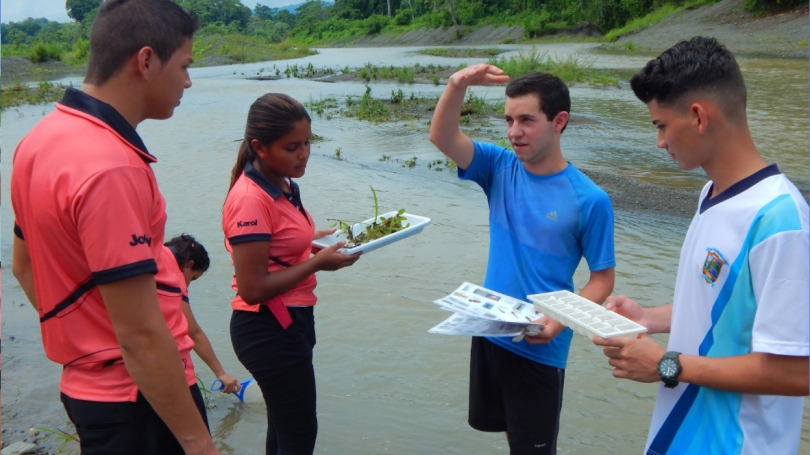
- About
- Programs
- Student Opportunities
- For Faculty
- News & Events
Back to Top Nav
Back to Top Nav
Back to Top Nav
Back to Top Nav
Back to Top Nav
by Victoria Chi '17
During the spring of 2017, Alexander Cotnoir '19 interned in Costa Rica at Osa Conservation, an organization that works to protect the biodiversity of Osa Peninsula.
When students engage in internships abroad, they often have to adapt to new and unexpected work environments. Few students, however, have to brave thunderstorms and earthquakes, poisonous snakes and insects, and toxic plants. Environmental Studies major Alexander Cotnoir '19 confronted all of these obstacles, fearlessly and even with excitement, during his internship in the spring of 2017.
Cotnoir, a student passionate about community engagement in environmental issues and sustainable development, worked in Costa Rica at a nonprofit organization called Osa Conservation that focuses on protecting the biodiversity of the Osa Peninsula. Specifically, Cotnoir was an intern in a program called Ríos Saludables, or "Healthy Rivers," a community-oriented water quality monitoring initiative. Over the course of two months, he split his time between teaching local community members about the importance of watershed monitoring and taught them how to conduct chemical and biological assessments. Cotnoir also assisted with water quality data collection and the creation of standardized watershed monitoring protocols.
When not focusing on the Ríos Saludables initiative, Cotnoir was eager to help out with other jobs: completing chores on the organic farm, relocating sea turtle nests at Piro Beach, mapping experimental forest restoration plots, and much to his excitement, bringing local junior and high school students out to the rivers to learn about macroinvertebrate communities. Some days, he would join nighttime turtle patrols that involved walking several miles on sandy terrain before the crack of dawn, followed by a morning of river monitoring, and an afternoon at the Osa Verde nursery. Throughout all of these experiences, Cotnoir drew upon his conversational fluency in Spanish and his affinity for fieldwork.
Throughout his internship, Cotnoir faced trials associated with working in a remote field setting. From cars breaking down and leaving him with no transportation, to torrential rains and occasional earthquakes, to diverse and sometimes dangerous flora and fauna, Cotnoir braced himself for new and exciting challenges each day. The internship also required flexibility and adaptation to a different culture.
"Although I came to appreciate the 'pura vida' way of life, I must admit that living in an environment where schedules and commitments are often changing or occasionally not being adhered to was a difficult aspect of my experience," recounted Cotnoir. These unforeseen challenges, whether related to limited infrastructure or cultural differences, made his time spent at tropical field stations in Costa Rica all the more unique.
In the end, Alexander Cotnoir's experience interning with Osa Conservation in Costa Rica was a transformative one. He conquered his fear of poisonous snakes just as he overcame his anxiety in teaching students about watershed systems entirely in Spanish, all while gaining a new appreciation for Central American culture.
"My experience has greatly impacted my professional and personal plans…. I learned the true extent of my passion for teaching, was inspired to tackle more sustainability concerns back in the U.S. through community approaches, and was able to apply skills from the classroom in a truly unique field setting," summarized Cotnoir. "Interning for Osa Conservation with the support of the Dickey Center has been one of the most impactful and enriching aspects of my educational journey both here at Dartmouth and throughout my life."